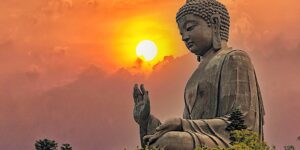The Lotus Born Guru Rinpoche: Master Padma’s Ten Key Points, Ten Foundations, Ten Faults, Ten Superficialities
Has your Dharma practice become superficial? Are you trying to discover what errors or faults you have made in your practice? Superficiality, or alternately, distraction, are common Dharma obstacles in this “age of degeneration.” It is reassuring to know that advice written centuries ago, by Lady Tsogyal, recording the words of the perfect Lotus Born Padmasambhava, is as pithy and relevant today as it was in old Tibet.
Master Padma said: There are many people who let their Dharma practice become superficial.
Almost certainly some of the most precious insights on the practice of Vajrayana, came from the Enlightened Master Padmasambhava, Guru Rinpoche. One particular collection of insights, Dakini Teachings is especially profound — yet expounded with the perfection of simplicity. My favorite teachings are Guru Rinpoche’s “Tens.” These “tens” distill practice down to true essence, with pithy statements like:
You must yearn for the Dharma like a starving person yearning for food.

Padmasambhava’s Ten Key Points
Master Padma said: When practicing the Dharma you must possess ten key points.
- You must possess the key point of faith free from fluctuation, like a river.
- You must possess the key point of compassion free from enmity, like the sun.
- You must possess the key point of generosity free from prejudice, like a spring of drinking water.
- You must possess the key point of Samaya, free from flaws, like a crystal ball.
- You must possess the key point of view free from partiality, like space.
- You must possess the key point of meditation free from being clarified or obscured, like the sky at dawn.
- You must possess the key point of conduct free from adopting or avoiding, like dogs or pigs.
- You must possess the key point of fruition free from abandonment or attainment, like arriving at an island of precious gold.
- You must yearn for the Dharma like a starving person yearning for food.
- In any case it seems that people only avoid practicing the Dharma as the main point, taking instead wealth as their focus. You cannot bring your wealth along at the time of death, so make sure not to go to lower realms.
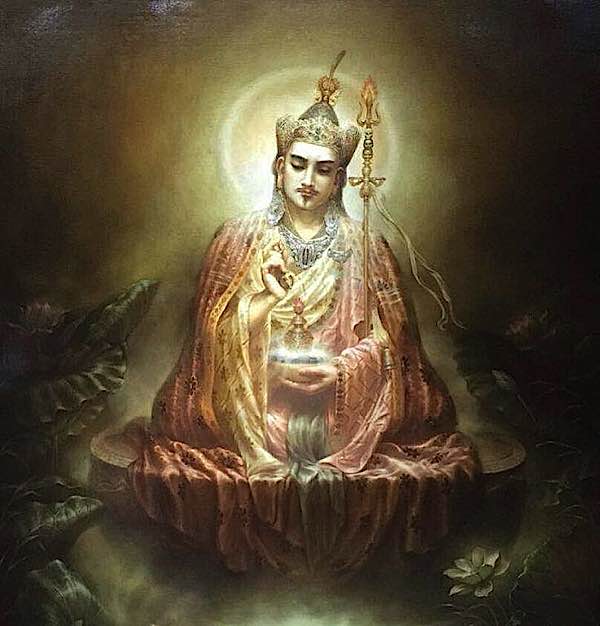
Padmasambhava’s Ten Foundations of Training
You must liberate your being through learning, becoming adept in all aspects of Dharma, like a noble steed freed from its chains.
The master said: When practicing the Dharma, you must train perfectly in the ten foundations of training.
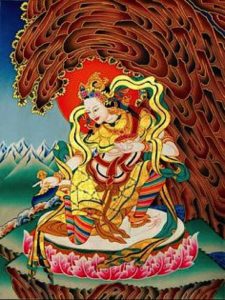
The lady asked: What are these ten foundations of training?
The master said:
- You must resolve through the view, gaining understanding of all the teachings, like a garuda bird soaring in the skies.
- You must find certainty through the conduct, without being intimidated by anything whatsoever, like an elephant entering the water.
- You must practice through the Samadhi, clearing away the darkness of ignorance, like lighting a lamp in a dark room.
- You must accomplish the aim through the instructions, liberating all phenomena in your nature, like finding a wish-fulfilling jewel.
- You must progress gradually through the empowerments, being free from the fear of falling into samsara, like a prince ascending the royal throne.
- You must keep the basis through the Samayas, not letting any of your actions be wasted, like fertile ground.
- You must liberate your being through learning, becoming adept in all aspects of Dharma, like a noble steed freed from its chains.
- You must compare all sources, understanding all the philosophical schools of the Dharma, like a bee seeking a hive.
- You must condense them into a single point, understanding that all the numerous teachings are of one taste, like a trader adding together his profits.
- You must reach eminence in knowledge, understanding clearly the meaning of all the teachings, like arriving at the summit of Mount Sumeru.
The people of Tibet who desire to be learned without training themselves in these points are not learned in the essential meaning, but become practitioners with much sectarianism. This is due to the fault of not having become adept in these ten foundations of training.
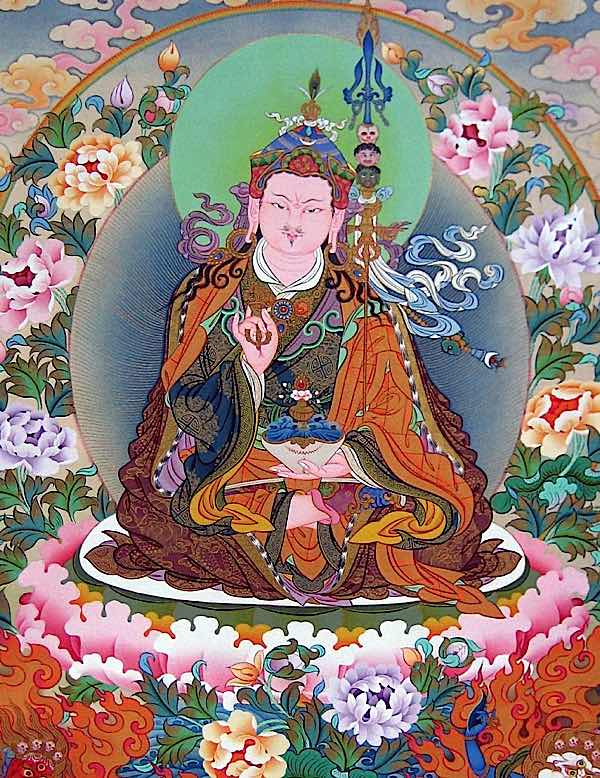
Padmasambhava’s Ten Faults
If you do not liberate your being through learning, you will not taste the flavor of the Dharma.
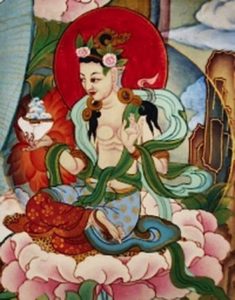
The Lady asked: What are those faults?
The master said:
- If you do not resolve through the view, you will have the fault that where you may fare lies uncertain.
- If you do not find certainty through the conduct, you will have the fault of being unable to unite view and conduct.
- If you do not know how to practice by means of Samadhi, you will not perceive the nature of Dharmata.
- If you do not accomplish the aim through the oral instructions, you will not know how to practice.
- If you do not progress gradually through the empowerments, you will not be suitable to practice the Dharma.
- If you do not keep the basis through the Samayas, you will plant the seeds for the hell realms.
- If you do not liberate your being through learning, you will not taste the flavor of the Dharma.
- If you do not compare all sources, you will not cut through the sectarianism of philosophical schools.
- If you do not condense them into a single point, you will not comprehend the root of the Dharma.
- If you do not reach eminence of knowledge, you will not perceive the nature of the Dharma.
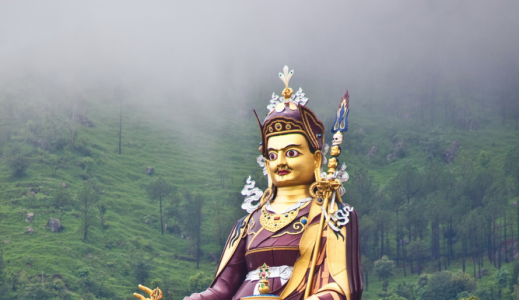
Padmasambhava’s Ten Superficialities
It is superficial to be altruistic without feeling compassion.
Master Padma said: There are many people who let their Dharma practice become superficial.
The Lady asked: How is that?
The Master said:
- It is superficial to chant the scriptures without having faith.
- It is superficial to be altruistic without feeling compassion.
- It is superficial to act generously without being free from stinginess.
- It is superficial to be a tantrika who does not keep the Samayas.
- It is superficial to be a monk who does not keep the vows.
- It is superficial to have knowledge without practicing the Dharma.
- It is superficial to engage oneself in Dharma that does not possess the essence of practice.
- It is superficial to teach others when one does not act in accordance with the Dharma oneself.
- It is superficial to give advice that one does not follow oneself.
In any case, my ears are tired of listening to “learned people whose Dharma practice does not tame their own minds, but who simply let it add disturbing emotions; whatever they say is nothing but superficial talk.”
More Tens
 There are more tens in the teachings of Padmasambhava, as recorded by Lady Tosgyal, in the superb, concise text: Dakini Teachings, Padmasmbhava’s Oral Instructions to Lady Tsogyal.
There are more tens in the teachings of Padmasambhava, as recorded by Lady Tosgyal, in the superb, concise text: Dakini Teachings, Padmasmbhava’s Oral Instructions to Lady Tsogyal.
Some of the other tens of the great Master are:
- The Ten types of Exaggeration
- Avoiding the Ten Faults
- Ten Virtuous Qualities
- Ten Signs.
Latest Features
Please support the "Spread the Dharma" mission as one of our heroic Dharma Supporting Members, or with a one-time donation.
Please Help Support the “Spread the Dharma” Mission!

Be a part of the noble mission as a supporting member or a patron, or a volunteer contributor of content.
The power of Dharma to help sentient beings, in part, lies in ensuring access to Buddha’s precious Dharma — the mission of Buddha Weekly. We can’t do it without you!
A non-profit association since 2007, Buddha Weekly published many feature articles, videos, and, podcasts. Please consider supporting the mission to preserve and “Spread the Dharma." Your support as either a patron or a supporting member helps defray the high costs of producing quality Dharma content. Thank you! Learn more here, or become one of our super karma heroes on Patreon.
Lee Kane
Author | Buddha Weekly
Lee Kane is the editor of Buddha Weekly, since 2007. His main focuses as a writer are mindfulness techniques, meditation, Dharma and Sutra commentaries, Buddhist practices, international perspectives and traditions, Vajrayana, Mahayana, Zen. He also covers various events.
Lee also contributes as a writer to various other online magazines and blogs.




